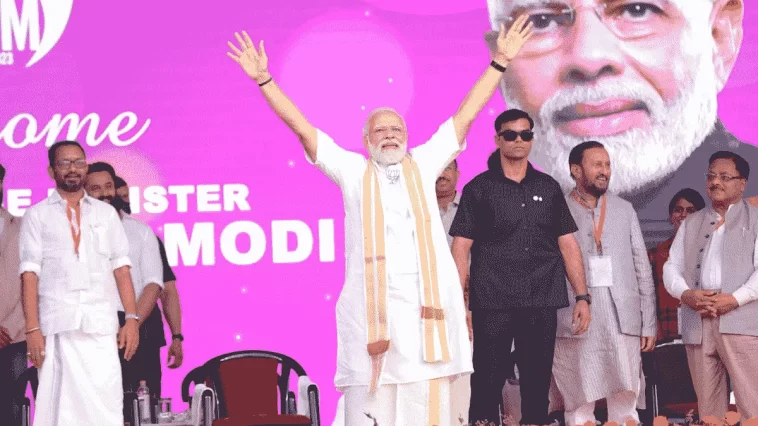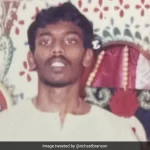As he laid foundation stones and inaugurated development projects worth over 3,200 crore in Thiruvananthapuram, Kerala, on Tuesday, Prime Minister Narendra Modi stated that his government has prioritized cooperative federalism while emphasizing the significance of state development to that of the nation.
He stated that investments in connectivity expand the purview of services, reduce distance, and connect diverse cultures without regard to caste, creed, or socioeconomic standing.
Modi stated that the meetings and events of the G20 intergovernmental forum held in Kerala had increased the state’s global visibility.

This year, India is hosting global leaders and meetings throughout the country, having assumed the forum’s presidency in December.
Modi previously inaugurated Kerala’s first semi-high-speed train, the Thiruvananthapuram-Kasaragod Vande Bharat Express, the country’s first water-integrated metro system in Kochi, and a Digital Science Park.
He stated that these initiatives will enhance the state’s growth and connectivity. Modi extolled the people of the state, stating that their diligence and politeness give them a distinct identity. He discussed the level of education and awareness in Kerala. “…the people of Kerala are able to comprehend the global context, and they can appreciate how India is regarded as a hotbed of development in these troubled times…”
ALSO READ :MCD elects Delhi mayor, deputy mayor today.
Modi stated that India’s progress is being recognized internationally. He stated that the world’s confidence in India is due to a decisive central government. Modi stated that the government makes swift and decisive decisions for the welfare of the nation’s citizens. He added that unprecedented investments have been made to improve and strengthen the infrastructure.
Modi also mentioned investments made in augmenting the skills of young people and his government’s commitment to easing the burdens of living and conducting business.
“Our administration prioritizes cooperative federalism. It views the development of the states as the formula for the nation’s development. If Kerala develops, national development will accelerate. We are laboring with a spirit of service, he said.
He stated that his government’s outreach to the Indian diaspora contributed to India’s rising prominence. Modi added that this has benefited Keralites abroad as well. The Indian diaspora has benefitted tremendously from India’s rising power.
In the past nine years, Modi stated, connectivity and infrastructure projects have been carried out with unprecedented pace and scope. “…it is proposed to spend more than 10 lakh crore on infrastructure in this year’s budget as well. The public transportation and logistics industries are undergoing a comprehensive transformation. We are approaching the golden period of the Indian railways.”
Since 2014, the average rail budget has increased fivefold, according to Modi. He mentioned the evolution of Kerala’s railways over the past nine years. Modi stated that work has begun on the redevelopment of three main railway stations in Kerala in an effort to transform the state into a multimodal transportation hub.
Modi stated, “Vande Bharat Express is the embodiment of India’s aspirations.” He added that the transformed rail network has enabled the operation of such semi-high-speed trains.
He stated that Vande Bharat railroads connect culturally, spiritually, and touristically significant locations.
Modi discussed the environmental advantages of modern trains. “Work has begun to prepare the Thiruvananthapuram-Shoranur corridor for semi-high-speed trains. After completion, semi-high-speed trains will be able to operate between Thiruvananthapuram and Mangaluru.
Modi stated that the water metro is a made-in-India initiative that will provide residents of Kochi’s islets with modern and affordable transportation options. In addition, it will provide intermodal connectivity between the bus terminal and the metro system, as stated by the speaker. “…it will benefit rural tourism in the state in addition to reducing traffic congestion in the city.”
Modi stated that the water metro will serve as a paradigm for the rest of the nation. In addition, he emphasized the significance of digital connectivity.
Modi arrived in Kerala on Monday for a two-day visit, during which he spoke at a youth conclave and met with Christian leaders in Kochi.
In his address to the youth conclave in Kochi on Monday, Modi stated that Kerala will soon join Goa and the northeastern states in accepting the Bharatiya Janata Party (BJP) as he called for change in the state. Modi blamed the Left Democratic Front, headed by the ruling Communist Party of India (Marxist) or CPI(M), and the United Democratic Front, led by the opposition Congress, for retarding the development of the state.
The BJP returned to power in Goa, which has a Christian population of 25.10%, last year. It shares authority with regional parties in the northeastern Christian-majority states of Meghalaya and Nagaland.
Modi’s meeting with the president of the Syro-Malabar church, Cardinal George Alancherry, and eight other Christian leaders in Kerala on Monday occurred in the context of BJP efforts to reach out to the state’s Christians, who make up 18.38% of the population, compared to Hindus (54.73%) and Muslims (26.53%).
In the 2021 Kerala assembly elections, the BJP lost its single seat. Outreach to the Christian community is viewed as a crucial component of the BJP’s efforts to penetrate the state.




